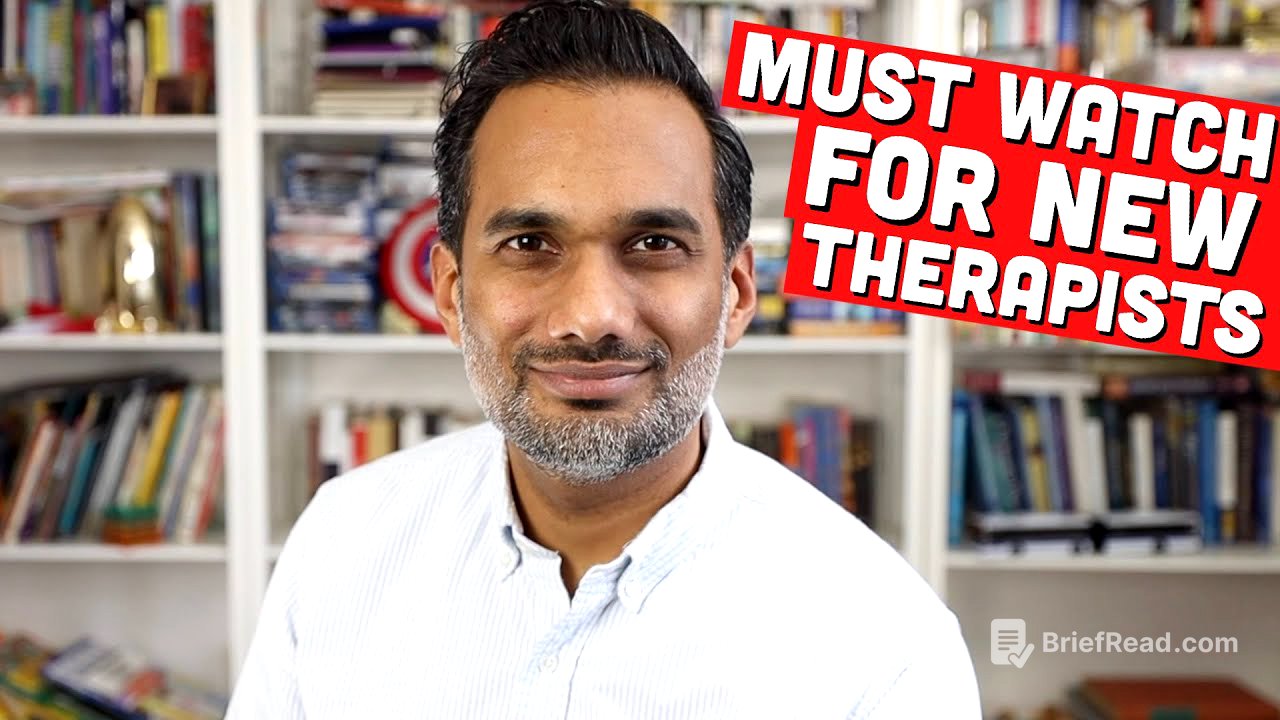TLDR;
This video provides six key pieces of advice for new therapists, drawing from Dr. Mattu's experience in training psychologists, social workers, and psychiatrists. The advice includes seeking direct feedback, taking on challenging cases, acknowledging one's ignorance, understanding the limits of one's role, recognizing personal blind spots, and establishing healthy boundaries. These tips aim to support new therapists in their professional growth and prevent common pitfalls.
- Seek direct feedback to improve skills through deliberate practice.
- Embrace challenging cases to expand your knowledge and comfort zone.
- Acknowledge your limitations and seek guidance when unsure.
- Understand that you are not a savior, but a facilitator of your patient's growth.
- Identify and manage your blind spots to provide effective care.
- Establish and maintain healthy boundaries to prevent burnout and ensure ethical practice.
Get Direct Feedback [0:47]
The importance of obtaining direct feedback is emphasized through examples such as video-taped sessions reviewed by supervisors. This method allows for detailed analysis of the therapist's behavior and techniques, facilitating immediate improvements. Deliberate practice, a technique used by musicians and athletes, involves performing a task, receiving feedback, integrating the feedback, and repeating the process. This iterative approach is crucial for skill enhancement in therapy.
Take on a Case That Scares You [2:44]
Taking on cases that are outside of one's comfort zone can lead to significant professional growth. Dr. Mattu shares his experience of treating a patient with autism spectrum disorder, OCD, and school refusal, which initially scared him but ultimately expanded his expertise and influenced his future cases. It's also important to recognize when a case is not a good fit, as this can provide valuable insights into one's limitations and areas for improvement.
Own Your Ignorance [4:52]
Acknowledging one's ignorance is crucial for ethical practice. Dr. Mattu recounts a situation where he didn't know how to apply a timeout strategy with twins and initially tried to improvise an answer. Instead of making something up, it's better to admit uncertainty and consult with supervisors or colleagues. This approach fosters trust with patients and ensures they receive evidence-based advice. Recognizing and addressing impostor syndrome and the Dunning-Kruger effect are also important in this context.
You Are Not a Savior [8:48]
Therapists should avoid the trap of trying to "save" their patients. Dr. Mattu shares an experience where he spent too much time trying to help a patient who needed a higher level of care. The therapist's role is to provide effective, ethical, and responsive treatment within their abilities and the limitations of the environment. The focus should be on helping patients develop their own problem-solving skills and resilience, rather than fixing them.
Know Your Blind Spots [11:10]
Identifying and understanding one's blind spots is essential for providing appropriate care. Dr. Mattu discusses how his personal experiences with homesickness initially made it difficult for him to treat patients with similar issues. Recognizing these blind spots allows therapists to seek consultation, support, or refer cases to other professionals. Blind spots can change over time, so continuous self-awareness is necessary.
Start Practicing Good Boundaries [13:54]
Establishing good boundaries early in one's career is crucial for preventing burnout and maintaining ethical practice. Dr. Mattu shares his experience of not charging for missed sessions as a trainee and the negative impact it had on him later on. Setting boundaries, such as enforcing cancellation policies, checking emails only during business hours, and taking time off, are essential for self-care and professional well-being. Starting these practices as a trainee will make it easier to maintain them as a full-time therapist.
Get Comfortable Being Uncomfortable Challenge [17:02]
Dr. Mattu shares his personal challenge of being comfortable with his home not being perfect when friends visit, highlighting the importance of letting go of perfectionistic thinking.
Comment of the Week [18:17]
Katie Jo's comment about enjoying Dr. Mattu's Star Wars video despite not being a fan of the franchise made him feel appreciated and validated the effort he put into creating the content.









